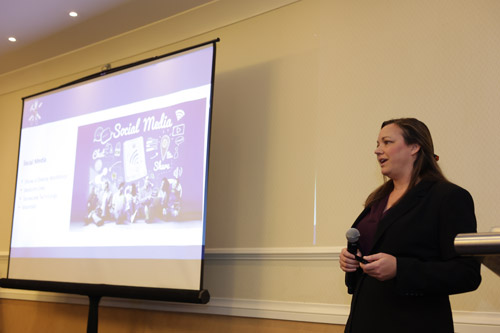The 2023 Coordinators Conference focused on the future, with more than 75 training coordinators and directors gathering for the annual event Aug. 3 and 4 in Washington, D.C. With the largest attendance in recent years, the International Training Institute (ITI) conference showcased tomorrow’s outlook, technology and training information with a sense of hope and excitement.
Nearly every aspect of the conference referenced back to the recruitment and retention of apprentices and members, from who is being recruited to the benefits and training opportunities available to them.
Recruitment and retention today means more than it did just a few years ago. Today, the promise of zero college debt and a livable, middle-class wage is still a large draw, but mental health safety, diversity, equity and inclusion training, and a welcoming, educational environment have become even more important to the next generation of apprentices.
“The world has changed. People have changed. Our industry has changed. You have to change,” said Mike Harris, ITI administrator.
According to the Occupational Safety and Health Administration (OSHA), the construction industry lags far behind other industries when it comes to diversity. As of 2021, the Bureau of Labor Statistics reports that 87.9% of the construction workforce is white and 89% is male. The same report states that while 11% of the industry is female, women only make up 3.7% of construction labor. Not surprisingly, such a lack of diversity can create a hostile work environment. Tammy Meyen, ITI recruitment and retention specialist, recommends forging ties with the community.
Tammy Meyen, ITI recruitment and retention specialist, recommends forging ties with the community.
A key challenge in recruiting young people is often their perceptions about careers in the trades. Tammy Meyen, ITI recruitment and retention specialist, said that locals need to partner with schools, churches, community groups and state agencies to help spread the positive aspects of trade apprenticeship. She also emphasized the need to forge relationships with high school guidance counselors and apprenticeship readiness programs, which help create pathways to a local’s apprenticeship program.
“We know that a more diverse workforce lends itself to a more inclusive workforce,” Meyen said. “We also know that we can attract more people into our apprentice pool if we make our programs more accessible. Research shows that 86% of the generation entering the workforce cares about supporting diversity.”
From recruitment and retention and grants to curriculum, standards and handbooks, the conference offered coordinators various ways to meet the demand in their parts of the country and make apprenticeship a welcoming place. This approach can help individual apprentices while also strengthening the overall membership at the International Association of Sheet Metal, Air, Rail and Transportation (SMART) workers.
“At our training centers, we want every apprentice to know they are valued,” Harris said. “And that we want them to become lifelong SMART members.”


Report Abusive Comment